
Do you want to enrich your life and learn a new skill? Try learning a new language! With the emergence of AI, it’s easier than ever to learn a new language and develop your skills with the tool. An AI language learning app is an app that uses built-in AI features to provide an interactive learning experience to help people in their journey.
There are so many benefits of using AI language learning apps, from real-time feedback to constant availability; this style of learning is a popular one for many. With AI features, you can practice everything from grammar to speaking, and the tools will guide you through the process.
The apps can also create different real-life scenarios that help you to practice and develop your skills. Furthermore, you can also use the apps to work at your own pace and go over old topics.
There are plenty of AI apps to choose from if you’re thinking of learning a new language. Each one is designed to help you learn and enhance this new skill. In this article, we’ll explore 20 of the best AI language learning apps and discover their features or any pros and cons to be aware of. Before we get started, here’s a table of the top 5:
AI Language Learning App | Key Features | Price | Reviews |
| AI tutor who talks and sounds like a real person. The tutor provides instant feedback in a stress-free zone. | 1 month: $29.99 3 months: $36.99 6 months: $49.99 | “I just started using this app and I love it.” |
| Gamification, progress-tracker, vocabulary repetition. | Free version, $12.99 per month, $59.99 per year. | “I had a great experience with Duolingo!” |
| Podcasts to listen to, short and concise lessons, and everyday conversations to practice. | Free trial, £9.99 per month for three months, £7.49 per month for six months, £5.99 per month for twelve months. | “The lessons are clear and easy to understand, and I love that the speakers go slowly enough for beginners to understand.” |
| Real-time feedback, personalized sessions, and role-play scenarios. | Free plan, Premium Monthly for $4.99, Premium Yearly for $3.34 per month. | “Talkpal’s chat feature is a game-changer! It’s like having a language tutor in my pocket 24/7.” |
| Live lessons, bite-sized lessons, phrasebook feature. | Free trial, £15.99 per month for three months, £13.99 per month for twelve months, £399 for the lifetime subscription. | “I find it easy to use and great value for money. Very much appreciate it’s not a gamified system like one language app!” |

MakesYouFluent is a popular app that offers an AI tutor to help learners develop their skills and enhance their progress. Users can enjoy the perks of instant feedback and practice in a stress-free environment. There is no need to wait until a real person is available to help you; the AI tutor is available 24/7.
Users who have first-hand experience using the app have taken to popular platforms to express their opinions. Customers really like the AI tool because it helps fix mistakes and makes conversations flow smoothly. Overall, the majority of users are impressed with the app’s ease of use and instant, real-time feedback.

Duolingo is a very well-known language-learning app with millions of users worldwide. You can choose from over 30 languages and use the app’s lessons and gamified approach to learn new skills.
A lot of users have expressed their positive feelings towards Duolingo, commending the app for its fun design and enjoyable activities. Furthermore, people enjoy the bite-sized lessons, stating that they’re very engaging and work well for picking up a new language.

Babbel empowers people to learn a new language and develop their skills. On the app, you can learn words for real-world scenarios through bite-sized lessons. The app’s content is quite challenging, so it’s a good option for anyone who already has some prior experience.
According to reviews, Babbel is much more professional than its alternatives. Furthermore, it has many five-star reviews on Trustpilot from users who are impressed with the app and the progress they’ve made. Many users also commend the app’s well-structured lessons with effective and easy-to-follow repetition.

Talkpal is an AI-powered tool that’s great for learners. The app works by creating real-life scenarios where the user can learn new phrases and vocabulary and put it to use. Depending on your progress and initial understanding of your chosen language, you can also enjoy a personalized learning experience.
Talkpal has many positive reviews online, and the benefit of AI tutoring is commonly appreciated. Users enjoy the way the AI feature works, as it helps you improve by correcting you and encouraging you to repeat activities, just like a human tutor would. Furthermore, the chat feature and 24/7 accessibility are also commended in reviews.

Rosetta Stone is best known for its immersive learning experience. It runs on the idea that the best way to learn is by diving straight in. It offers a wide range of languages, and the plan offers interactive activities and the option of listening to a native speaker to help develop your skills. AI technology helps create an immersive experience where real-life scenarios are simulated.
Users online praise Rosetta Stone for its easy-to-use interface, immersive experience, and benefits. The immersive experience is mentioned a lot in reviews, with users expressing how it’s enhanced their overall understanding.
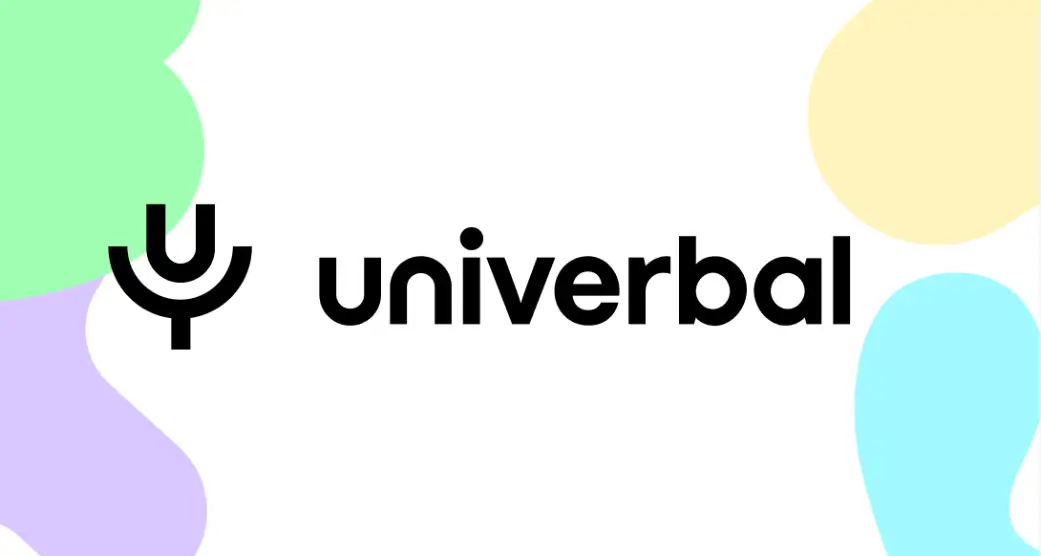
Univerbal is an AI language tool that helps users solve real-world quests and challenges. You can choose from the AI-generated pictures of people and begin a conversation about any kind of topic.
Users express their fondness for the app and how easy it is to use every day. Furthermore, it’s praised for its dedication to helping users improve their conversational skills.
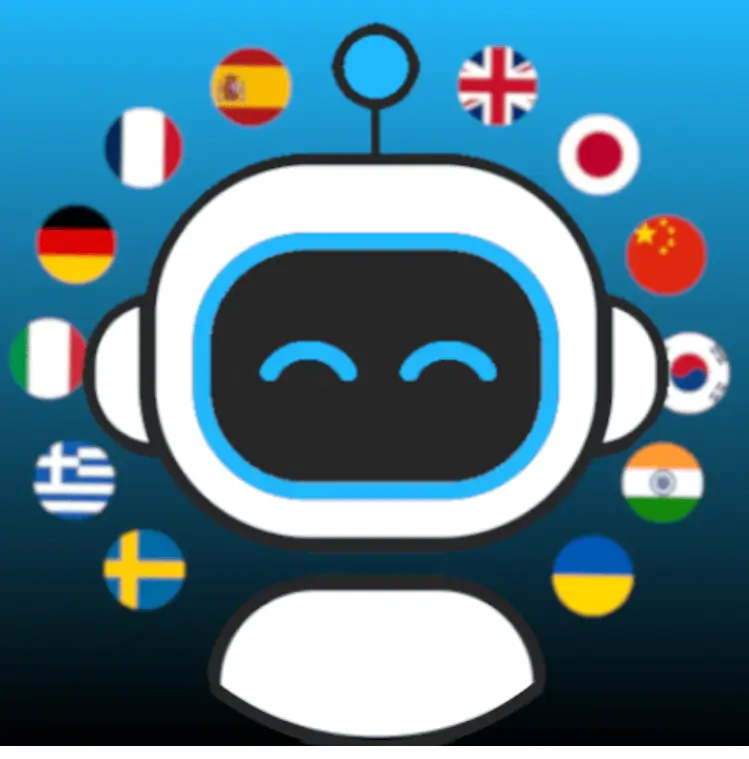
Tutor Lily is an AI-powered app that lets you speak to a language coach at any time of the day. You can select your chosen language and begin practicing your conversational skills straight away while receiving real-time feedback.
Many positive reviews surround this platform, as users state how much they enjoy the instant feedback and how much it’s helped them. According to reviews, the explanations are easy to understand, and the chatbot’s 24/7 availability is noted as highly useful.

Memrise is a popular language app that’s all about repetition. It uses a repetition system to try and predict when a word or phrase might slip from your mind through daily lessons and quizzes. It’s very vocabulary-driven, which is good practice for beginners.
Overall, the reviews of Memrise are positive, with users expressing how much they learned in a short space of time. People also enjoy the option of customizing the amount of time they can spend learning a day, helping create more of a personal feel.

LingoDeer specializes in Asian languages, like Vietnamese and Korean. However, you can choose from 14 other options as there are other choices like French, Italian, and more. The curriculum is created by language teachers, making it an excellent choice for anyone who wants to develop their grammar and general understanding.
The reviews for LingoDeer are generally positive, with users commenting on how detailed the grammar explanations are. People seem to enjoy the different exercises and the useful, clear, and easy-to-follow native speakers.

HelloTalk is an interesting language learning app that connects people in different countries. When you sign up, you can connect with native speakers and message them directly. The built-in AI tool works to match you with the right person, and you can also enjoy activities and engaging lessons to help develop your skills further.
According to the reviews, HelloTalk is great for people who want to actively engage in a conversation with people looking to learn a new language.

Busuu offers users the opportunity to learn a new language and follows the Common European Framework of Reference (CEFR). This is internationally recognized and works in six different stages, from a total beginner to a fluent user.
Generally, the reviews for Bussu are positive, with users stating how enjoyable the interactive games and activities are. The community feedback section is liked amongst users, with some saying how much it helped them develop their skills.
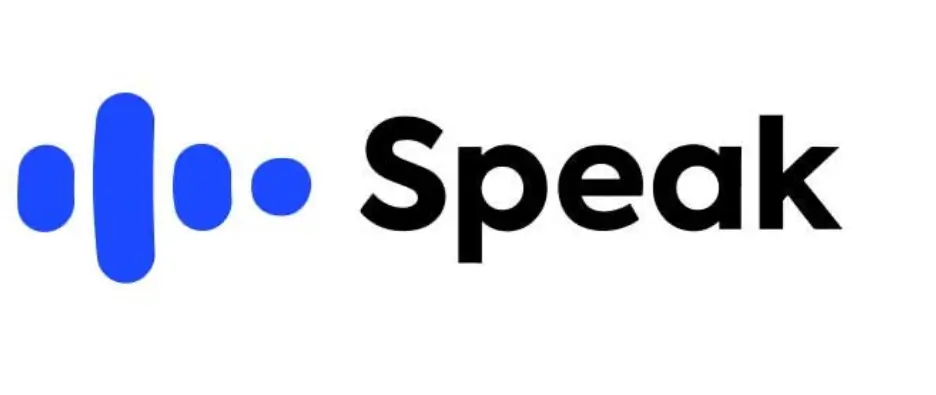
Speak is a language learning app that bases its practices on the importance of speaking a language in order to learn a language. “Speak Tutor” is the AI element of the app, acting as a live bot that helps you improve your speaking skills.
The reviews online are generally positive, with many users commending Speak for showing examples of mistakes. Users state that this is really useful during the learning stage, as they can learn from their errors. Furthermore, the AI voice used for the Speak Tutor is also said to be non-robotic, making it easier to listen to.

If you want to connect with native speakers, Tandem is your answer. The idea is that the AI tool will match you to a speaker who matches your goals and potential conversational interests.
Many reviews commend the app’s idea of pairing native speakers and learners and express their positive feelings towards this due to the cultural and interesting facts they pick up as a result.
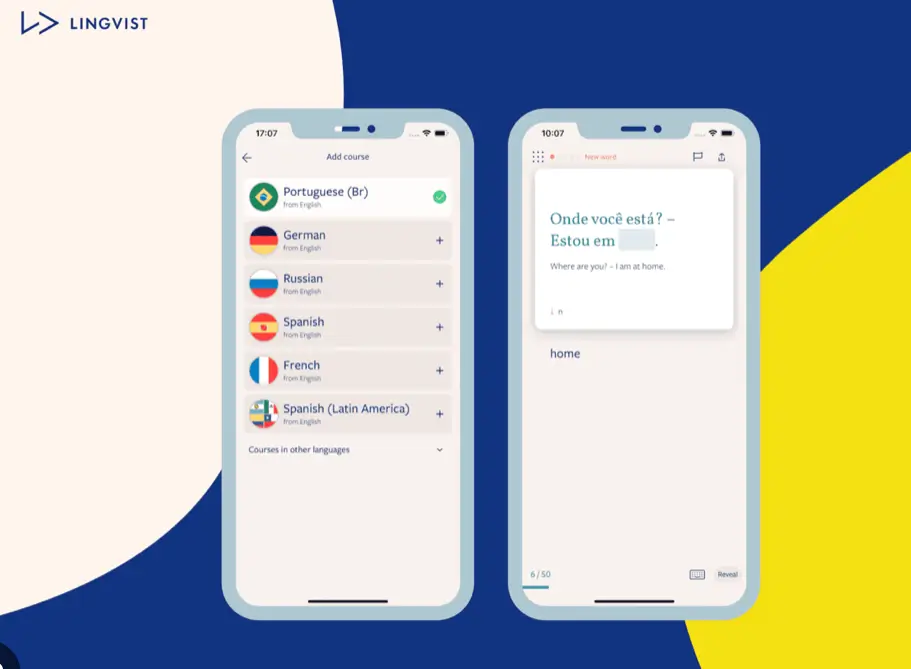
Lingvist is a language learning app that uses AI to help users develop their speaking, writing, and reading skills in their chosen language. The AI tutor personalizes the experience, adjusting the complication levels depending on progress.
Users are optimistic about their experience of using the app, stating how well the algorithm works to keep vocabulary relevant. Furthermore, users appear satisfied with how enjoyable the app is to use and the efforts to keep it as engaging as possible by the company.

If you want to practice natural conversations, ChatGPT covers a variety of topics. This isn’t specifically for users to learn a new language, but it’s a popular choice for anyone looking to develop their conversation skills. The tool aims to create human-like replies, so it’s ideal for anyone practicing talking in a different language.
Many users take the time to positively review the site and how it’s helped them develop a whole range of skills. They note the fast replies and the vocabulary list that users can use in different, real-life scenarios. Some users also enjoy the “speak” feature, which can help with practicing pronunciation.
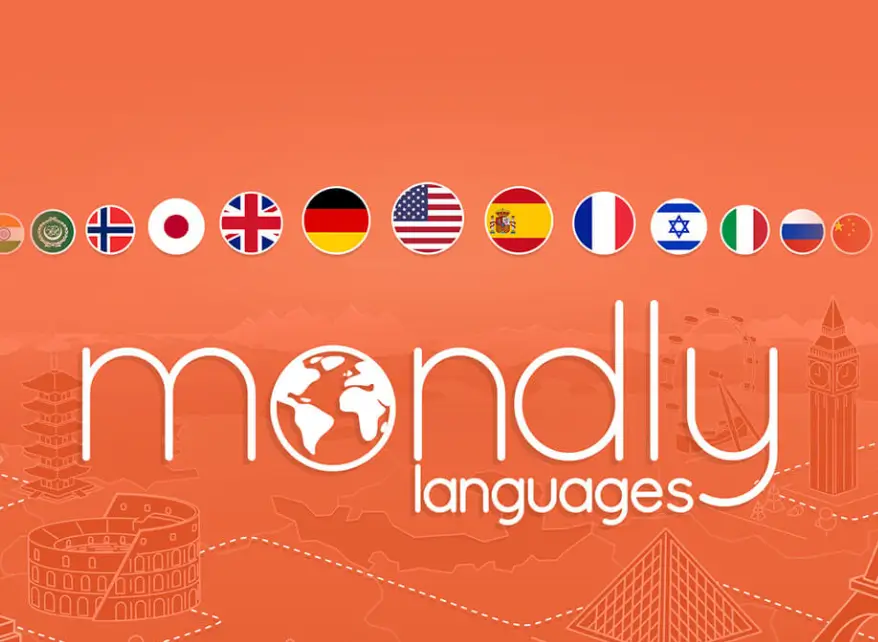
If you want to learn a new language in a fun way, try Mondly! There are over 41 languages to choose from, and you can use the AI chatbot tool to practice everyday conversations. You can listen to native speakers and practice your pronunciation by repeating what they say.
There are lots of positive reviews of the app. Users comment on the app’s vocabulary selection and how useful the daily tasks are. A lot of users also enjoy the selection of topics that are available and express how enjoyable lessons are.

Eggbun Education is an app for people who want to learn Chinese, Korean, and Japanese. There’s a little character called Lanny who follows your progress and guides you through. Furthermore, users need to download an Asian keyboard, furthering their knowledge and understanding of the language.
Users are generally positive about the app and express how its focus is on conversation and Korean culture is really engaging. The chatbot, Lanny, is a popular feature, with lots of users expressing how much it’s helped them.

Pimsleur promotes its approach of sounding like a near-native in just 30 days by learning for 30 minutes a day. They base this on the research of Dr. Paul Pimsleur, a linguistics professor who found that the best way to learn a new language is to hear it in everyday situations and respond to it.
A lot of users enjoy this way of learning and take to online platforms to express their happiness with their progress. Many users express how far their conversational skills have come by simply just listening to the native speakers. Furthermore, a lot of users like how convenient and accessible the app is to use, as you can listen to it on the go.

Drops is an AI foreign language learning app that uses a gamified approach to help people learn the language of their choice. It offers the option of learning over 50 languages and uses fast-paced and fun games to help users progress.
Many users like the fast-paced progress they make on the app and explain how the gamified approach helps them stay focused. They also enjoy the casual pace and like how it fits into their schedules.
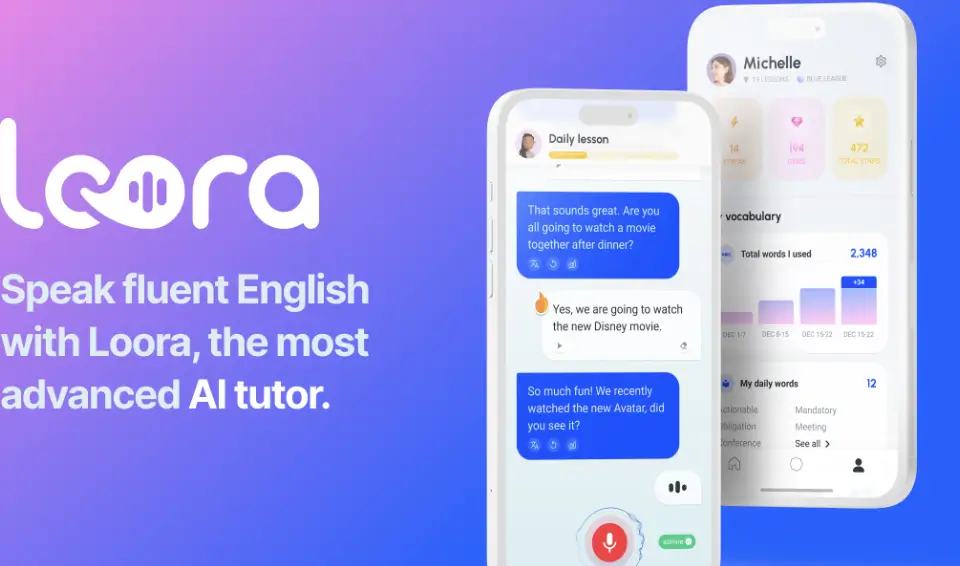
Loora is a platform for AI language learning that gives users an AI English tutor with which to practice. It’s designed to provide you with the most personalized experience and help you develop your skills as much and as quickly as possible. You can get instant feedback, helping you stay on track and enjoy learning in a judgment-free zone.
One of the main reviews for Loora is its excellent speech recognition, and users have expressed how this makes the practicing process a lot easier! Many users also enjoy the amount of variation when it comes to topics.
Certain AI language learning apps work best for specific languages. These apps are designed to target particular ones and help users learn new skills and progress efficiently. Here are the most popular languages and some of the best AI language learning apps that can help you succeed:
Who said it’s just adults who can use apps to learn a new language? There are plenty of apps that cater to the budding learners of the world and tailor their tools and programs to engage the young minds of children. Looking for some ideas? Here are some examples:
Gus On The Go: This app is aimed at children ages 4-6 and works by using engaging, bite-sized lessons with basic, everyday vocabulary. On the app, the main character is an owl called Gus, who travels all over, picking up new words and phrases at every place he visits.
Rosetta Stone: Rosetta Stone is another good app for children. It’s very interactive and picture-based, which is great for kids. Like the adult version, the app uses an immersion technique and removes a lot of the child’s initial language. So, they can’t fall back on their native language; they have to work it out for themselves.
LingoPie: This app is great for children and uses shows and movies to present a new language. You even have the option to create flashcards or use the controls to cater to your child’s learning.
Mondly Kids: Mondly Kids offers engaging and child-friendly daily lessons. The lessons are short and teach children either new vocabulary or grammar. The app uses cartoons and characters to keep children engaged as they work their way through their ten-minute lessons.
Are you looking for a legitimate free AI language learning app? The good news is that there are options out there! Some apps offer some great features that you can enjoy without paying a thing! While some of the apps provide users with the option of in-app purchases, there’s still a lot you can do without paying! Here are some ideas:
Duolingo: Duolingo is a very popular app for anyone who wants to learn a new language, and there’s no limit on how many languages you can learn. You might not get the option to remove any ads or see your mistakes, but you can certainly enjoy the daily lessons, the gamified approach, and the structure.
Memrise: If you’re a beginner, Memrise is a great option, as you can use the content and early learning lessons for free. It’s important to note that the free version does have some limitations, so once you begin to succeed, you might feel like upgrading.
Busuu: This app has a free version and a premium version, but you can still access some great features without paying. You can sign up for free and enjoy the well-structured course that puts you on track to learn.
HelloTalk: You can use HelloTalk for free and access the basic features on the app. Without paying, you can participate in text and video conversations and mingle with different users on the app.
To rate the different language learning apps, we investigated each one thoroughly, exploring its features and payment options. Our primary goal was to determine which were the most effective, efficient, and interesting.
For the most reliable opinion, we felt like trying them out ourselves was the best way forward. So, we took the time to make our accounts, select our language, and begin the learning process.
Some of the elements we were looking out for were:
Once we had explored the apps, we turned to the user reviews to get a better idea of how some people found the experience of using them. We looked at the ratings on the different platforms and scrolled through many reviews to get a general idea of an app’s popularity. Furthermore, this enlightened us and allowed us to see if there were any issues or common unpopular features of the app.
Once we gathered the data and reviewed the different options, we felt able to rank the apps. We made sure to approach each one with an open mind and indulged in the process as if we were keen learners ourselves. The first-hand experience of using the apps combined with customer reviews helped us create a fair and clear ranking system.
If you want to kickstart your language learning process, you might wonder how to choose the right app for you. Here are some key factors to consider:
How much do you want to pay? If you’re a beginner, you might only need the free, basic version. Or, if you’re advanced already, you might have to pay to get more.
AI language learning apps come in different types, and they’re all designed to serve a slightly different purpose but help you reach the same goal.
Here are some of the different types:
Conversation-based apps: These are great for people who want to enhance their pronunciation and practice speaking in their chosen language. These kinds of apps are perfect for travelers and advanced learners who want to refine their skills.
Vocabulary-building and practice apps: These apps specialize in reinforcing and teaching vocabulary through flashcards and repetition. They are ideal for beginners who want to lay solid foundations.
AI tutor apps: Some apps use an AI tutor to help learners progress and enhance their skills. They often provide real-time, instant feedback and suggest corrections. This kind of app is good for anyone who wants support during the process.
Immersive apps: Some apps use immersive techniques to help people learn and dive into a language. This might include using a VR headset or changing the interface to a particular language. This is great for anyone who wants to enjoy the process and enrich their skills.
Gamified learning apps: Gamified apps help create a more enjoyable learning experience for users. Through engaging activities and games, users develop their skills. This is particularly popular with children who want to learn.
If you want to get the most out of AI for language learning, there are some great tips to keep in mind.
Here are our top tips:
Despite there being some excellent apps out there for learners of all skills to enjoy, unfortunately, there are some ones that we urge you to avoid.
Here are some ideas:
Google Translate: Has many negative reviews, especially in terms of its reliability and accuracy. While some words and phrases can be translated and learned by a user, they lack a progress tracker, structure, and correctness in some cases.
HelloPal: Not a very popular option, as many users have stated that some people use the app for inappropriate reasons. You can use it to speak with native speakers, yet many users are unhappy with their experience due to other users not exercising caution.
Voxy: This language learning app that helps people learn English has received a negative reputation due to its many features. While it has many, users find it confusing and overpowering, as there are multiple learning styles on display.
Discover Your Ideal Language Learning Method with AI-powered MakesYouFluent App And Learn Any Language You Want.
©MakesYouFluent
©MakesYouFluent | Terms & Conditions | Privacy